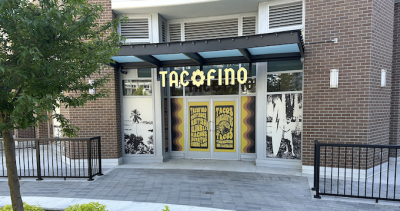With an eye on mindfulness, Vancouver's Werklab helps self-employed prioritize self-care
Self-care is often advertised as a lengthy bubble bath or particularly luxe sheet-mask application, but local entrepreneur Christina Disler understands that the term can be interpreted broadly. And in an increasingly connected world where “turning off” from work is, for some, easier said than done, self-care and -love is more important than ever.
“We believe that the work day is no longer 9 to 5, especially with technology and as people become business owners or are working as part of startups,” notes Disler during a tour of Werklab, the East Van coworking space she founded. “Self-care is a necessity but we still see it as a luxury, so it’s the first thing we let go of or drop when we see our workloads expand.”
In an effort to encourage Vancouver’s community of freelancers, entrepreneurs, and other self-employed folks to better incorporate health and mindfulness into their lives, Disler recently unveiled the 2.0 version of Werklab, which she opened in 2016. Now encompassing an additional floor in the industrial building at 1275 Venables Street it’s situated in, the airy 8,000-square-foot facility houses room for its 130 members to meet, work, and collaborate, as well as a separate wellness space where individuals can take five to stretch, meditate, or perhaps lose themselves in an aromatherapy session or sound bath.
Complimentary meditation and yoga-and-movement classes led by trained professionals are offered at Werklab almost daily, though members may also engage in self-guided sessions in a dedicated, light-filled studio. Hell, they can even take impromptu cat naps on the provided couch or squeeze in some time with an energy-healing practitioner who works onsite. It may all sound a little hippie, but according to Disler, such amenities are essential to estbalishing and maintaining work-life balance—especially for self-starters who may work around the clock.
In fact, it’s all part of the former human-resource specialist’s plan to build Werklab into a place where people can come to not just work, but relax, unwind, and grow both personally and professionally. “[In our old space,] we’d be lifting metal tables and moving them over to roll out 20 yoga mats,” she says. “And there was a point where it was like, ‘Okay, this health-and-wellness thing has become an important part of our identity and who we are, and this room is not working.’ So I knew I wanted to create a space where people could go for this. But not just a fitness studio—a place to create experiences.”
Community is also important at Werklab, where members work in fields that range from interior design and software development to architecture and nutrition. Many freelancers and small-business owners who choose to strike out on their own leave behind a tight network of colleagues, explains Disler, so she sought to create an environment where individuals could find comfort in familiar faces and build relationships.
Every person that Werklab accepts into its community contributes something back to the space, whether that be through taking pride in the lush, plant-filled rooms and cleaning up after themselves; collaborating with likeminded individuals on a project; or attending off-hour events like plant-medecine and guided-drawing workshops. “Our business is our community and you can’t put a dollar sign on the people here,” stresses Disler.
Other coworking spaces in Metro Vancouver—many of which have opened in recent years thanks to more and more citizens embracing the so-called gig economy—offer conveniences like production studios, coffee-stocked kitchens, and sound-engineering booths. But it’s rare to see such facilities prioritize health and wellness in the way that Werklab has. “Instead of it feeling transactional, where you pay us a fee and you get access to a receptionist, board room, or whatever,” says Disler, “we want it to be so much more.”















Comments